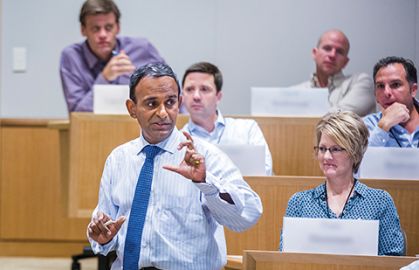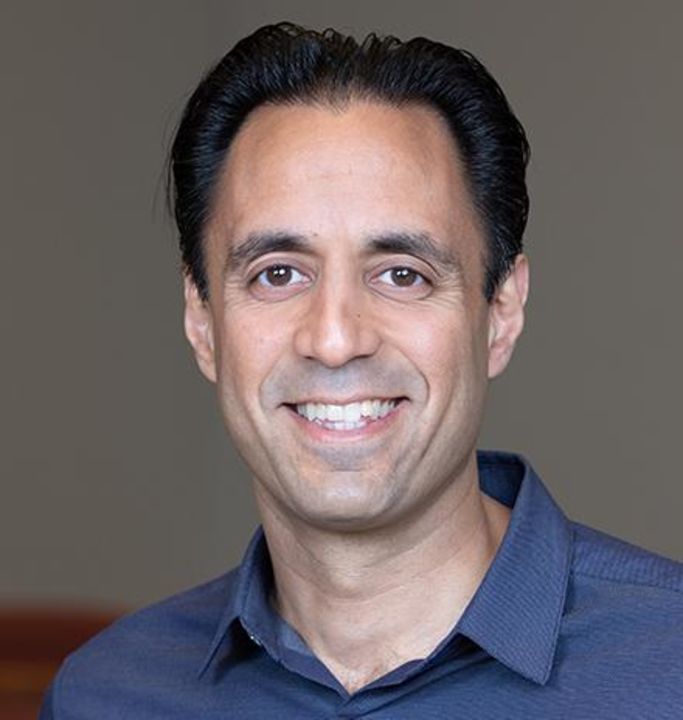Owner/President Management
- Upcoming Sessions
- (1 of 2)
- Dates: 12–31 MAY 2024 (Unit 1 only)
- Format: In-Person Learning takes place on the HBS campus or a designated location.
- Location: HBS Campus
- Fee: $50,000 (Unit 1 only)
- 12–31 MAY 2024 — Unit 1 (HBS Campus)
- FEB 2025 — Unit 2 (HBS Campus)
- MAR 2026 — Unit 3 (HBS Campus)
- 12–31 MAY 2024 — Unit 1 (HBS Campus)
- FEB 2025 — Unit 2 (HBS Campus)
- MAR 2026 — Unit 3 (HBS Campus)
- Dates: 01–20 SEP 2024 (Unit 1 only)
- Format: In-Person Learning takes place on the HBS campus or a designated location.
- Location: HBS Campus
- Fee: $50,000 (Unit 1 only)
- 01–20 SEP 2024 — Unit 1 (HBS Campus)
- SEP 2025 — Unit 2 (HBS Campus)
- NOV 2026 — Unit 3 (HBS Campus)
- 01–20 SEP 2024 — Unit 1 (HBS Campus)
- SEP 2025 — Unit 2 (HBS Campus)
- NOV 2026 — Unit 3 (HBS Campus)

"I not only gained knowledge and confidence, but also shared and celebrated the triumphs of others."

"I learned so much through OPM. More importantly, I was able to share the knowledge with my staff and my children."

"I don't think I could have anticipated the number of ways in which OPM is transformational."
Thank you for your interest in this program. The MAY 2024 session is filled to capacity, and additional applications will not be accepted. You may wish to consider applying to the 01–20 SEP 2024 session.
*If you are a Unit 1 participant, you will be notified when registration opens for Units 2 and 3. At that time, we will ask you to confirm your seat for the upcoming unit. Unit 2 and 3 fees may differ from Unit 1.
Summary
Building, leading, and growing a successful business can be an all-consuming challenge that leaves little time to focus on leadership and personal growth. But as your business challenges expand, so should your strategic vision and go-to-market options. Delivered in three units that span 24 months over three calendar years, the Owner/President Management (OPM) program is a transformative learning experience that will boost your leadership skills—and the value of your enterprise.
-
Summary
-
Building, leading, and growing a successful business can be an all-consuming challenge that leaves little time to focus on leadership and personal growth. But as your business challenges expand, so should your strategic vision and go-to-market options. Delivered in three units that span 24 months over three calendar years, the Owner/President Management (OPM) program is a transformative learning experience that will boost your leadership skills—and the value of your enterprise.
Key Benefits
-
Understand the major drivers of your business -
Position your business for long-term competitive advantage -
Strengthen your decision-making and negotiation skills -
Capitalize on disruptive innovation and rapid change -
Analyze existing resources and build new capabilities -
Formulate optimal financing strategies -
Embrace digital transformation to drive breakthrough innovation -
Lead organizational change and drive profitable growth -
Identify and exploit opportunities locally and internationally -
Navigate future business and personal transitions -
Build a rewarding and enduring network with OPM peers worldwide
-
Understand the major drivers of your business -
Position your business for long-term competitive advantage -
Strengthen your decision-making and negotiation skills -
Capitalize on disruptive innovation and rapid change -
Analyze existing resources and build new capabilities -
Formulate optimal financing strategies -
Embrace digital transformation to drive breakthrough innovation -
Lead organizational change and drive profitable growth -
Identify and exploit opportunities locally and internationally -
Navigate future business and personal transitions -
Build a rewarding and enduring network with OPM peers worldwide
Who Should Attend
OPM is designed for business owners and founders who meet the following criteria:
- You (or your family) hold a significant equity stake in the firm
- You have an active operating role in the firm
- The business has experienced substantive growth and scale since company inception
- Your role covers the scope of chief executive officer, chief operating officer, president, managing director, or executive director of the company
While the curriculum emphasizes entrepreneurial leadership, participants from multigenerational family businesses and long-established companies are also welcome to attend.
-
Who Should Attend
-
OPM is designed for business owners and founders who meet the following criteria:
- You (or your family) hold a significant equity stake in the firm
- You have an active operating role in the firm
- The business has experienced substantive growth and scale since company inception
- Your role covers the scope of chief executive officer, chief operating officer, president, managing director, or executive director of the company
While the curriculum emphasizes entrepreneurial leadership, participants from multigenerational family businesses and long-established companies are also welcome to attend.
Learning and Living at HBS
OPM is a highly structured yet deeply personalized experience. From the careful selection of living group members and new HBS case studies to professional executive coaching for individuals and teams, every aspect is designed to foster collaborative learning and accelerate personal growth.
-
Learning and Living at HBS
-
OPM is a highly structured yet deeply personalized experience. From the careful selection of living group members and new HBS case studies to professional executive coaching for individuals and teams, every aspect is designed to foster collaborative learning and accelerate personal growth.
Alumni Status
Upon completing the Owner/President Management program, you will become a lifetime member of the HBS alumni community—gaining exclusive access to our vast global alumni network and an array of resources that facilitate lifelong learning, growth, and success. Learn more.
-
Alumni Status
-
Upon completing the Owner/President Management program, you will become a lifetime member of the HBS alumni community—gaining exclusive access to our vast global alumni network and an array of resources that facilitate lifelong learning, growth, and success. Learn more.
Admissions Criteria and Process
The Application Process
HBS seeks entrepreneurial executives who have the potential to boost their leadership skills—and the value of their enterprise. We select applicants who embrace challenges, seek genuine personal and professional growth, and are ready to innovate—in themselves and in their organizations. The curious, open-minded executive who commits wholeheartedly will find the program to be a highly stimulating, rewarding—even life-changing—experience.
To apply, you will submit the application, telling us about your professional background, your organization, and your current responsibilities, goals, and challenges.
Answering Your Questions
English Proficiency
Learning Commitment
Residency on campus is required for the on-campus units, and classes are held six days a week. Your active participation in all classroom sessions, case discussions, and other program activities is essential, so you must be free of other responsibilities while you are on campus. Between sessions, you will be expected to reflect on and apply what you have learned.
Application Submission
Application Review
Fee, Payment, and Cancellations
The program fee covers tuition, books, case materials, accommodations, and most meals. Unit 2 and 3 fees may differ from Unit 1.
You will be invoiced upon admission to the program. Invoices are due within 30 days of receipt, or upon receipt if the program start date is less than 30 days from the invoice date. If you need to cancel or defer your participation, you must submit your request in writing more than 30 days before the start of the program to receive a full refund. Cancellation or deferral requests received 14 to 30 days prior to the start of the program are subject to a fee of one-half of the program fee. Requests received within 14 days are subject to full payment.
The Application Process
HBS seeks entrepreneurial executives who have the potential to boost their leadership skills—and the value of their enterprise. We select applicants who embrace challenges, seek genuine personal and professional growth, and are ready to innovate—in themselves and in their organizations. The curious, open-minded executive who commits wholeheartedly will find the program to be a highly stimulating, rewarding—even life-changing—experience.
To apply, you will submit the application, telling us about your professional background, your organization, and your current responsibilities, goals, and challenges.
Answering Your Questions
English Proficiency
Learning Commitment
Residency on campus is required for the on-campus units, and classes are held six days a week. Your active participation in all classroom sessions, case discussions, and other program activities is essential, so you must be free of other responsibilities while you are on campus. Between sessions, you will be expected to reflect on and apply what you have learned.
Application Submission
Application Review
Fee, Payment, and Cancellations
The program fee covers tuition, books, case materials, accommodations, and most meals. Unit 2 and 3 fees may differ from Unit 1.
You will be invoiced upon admission to the program. Invoices are due within 30 days of receipt, or upon receipt if the program start date is less than 30 days from the invoice date. If you need to cancel or defer your participation, you must submit your request in writing more than 30 days before the start of the program to receive a full refund. Cancellation or deferral requests received 14 to 30 days prior to the start of the program are subject to a fee of one-half of the program fee. Requests received within 14 days are subject to full payment.
What You Will Learn
Featuring three highly integrated units, the Owner/President Management program is designed to expand your leadership skills, confidence, and vision—and prepare you for the challenges and opportunities ahead. Each three-week unit delves into essential business fundamentals, emerging best practices, and areas of special interest to entrepreneurial business leaders.
Immersed in dynamic case studies, interactive faculty presentations, and individual and group exercises, you will focus on corporate growth, leadership expertise, and financial success. In addition to renowned industry guest speakers, the program features self-assessment and one-on-one coaching sessions to help you balance your business objectives with your personal and professional goals.
Between sessions, you will apply what you've learned back at your company, address specific needs, test new skills and insights, and reassess and improve your performance as a leader.
-
What You Will Learn
-
Featuring three highly integrated units, the Owner/President Management program is designed to expand your leadership skills, confidence, and vision—and prepare you for the challenges and opportunities ahead. Each three-week unit delves into essential business fundamentals, emerging best practices, and areas of special interest to entrepreneurial business leaders.
Immersed in dynamic case studies, interactive faculty presentations, and individual and group exercises, you will focus on corporate growth, leadership expertise, and financial success. In addition to renowned industry guest speakers, the program features self-assessment and one-on-one coaching sessions to help you balance your business objectives with your personal and professional goals.
Between sessions, you will apply what you've learned back at your company, address specific needs, test new skills and insights, and reassess and improve your performance as a leader.
Unit DetailsExpand AllCollapse All
UNIT 1: Analyzing and Pursuing OpportunitiesUNIT 1: Analyzing and Pursuing Opportunities
Format: On the HBS Campus (3 weeks)
- Expand the frameworks and approaches for analyzing your current business
- Identify opportunities and threats and then develop a plan to address them
- Assess your leadership style and your organization's ability to implement your plan
UNIT 2: Leading Growth and TransformationUNIT 2: Leading Growth and Transformation
Format: On the HBS Campus (3 weeks)
- Understand the analytical and leadership capabilities needed to drive growth
- Develop a plan for leading transformational change and sustaining profitability
- Assess the leadership, organizational, and governance capabilities needed during expansion
UNIT 3: Planning Future TransitionsUNIT 3: Planning Future Transitions
Format: On the HBS Campus (3 weeks)
- Develop your business strategy going forward and a game plan for executing it
- Identify future business and personal transitions and navigate them strategically
- Balance your business objectives with your personal and professional goals
UNIT 1: Analyzing and Pursuing Opportunities
Format: On the HBS Campus (3 weeks)
- Expand the frameworks and approaches for analyzing your current business
- Identify opportunities and threats and then develop a plan to address them
- Assess your leadership style and your organization's ability to implement your plan
UNIT 2: Leading Growth and Transformation
Format: On the HBS Campus (3 weeks)
- Understand the analytical and leadership capabilities needed to drive growth
- Develop a plan for leading transformational change and sustaining profitability
- Assess the leadership, organizational, and governance capabilities needed during expansion
UNIT 3: Planning Future Transitions
Format: On the HBS Campus (3 weeks)
- Develop your business strategy going forward and a game plan for executing it
- Identify future business and personal transitions and navigate them strategically
- Balance your business objectives with your personal and professional goals
Key TopicsExpand AllCollapse All
Performance Management: Balance growth, profitability, innovation, and riskPerformance Management: Balance growth, profitability, innovation, and risk
- Measure economic performance, improve resource allocation, implement strategy, and build performance accountability
- Translate your business strategy into performance targets and metrics
- Align front-line employees with strategic objectives
- Identify and manage organizational risks
- Create accountability systems to motivate entrepreneurship and innovation
- Build and lead a high-performance culture
Entrepreneurship: Drive high growth while managing uncertaintyEntrepreneurship: Drive high growth while managing uncertainty
- Identify and prioritize opportunities and risks
- Use business analytics to turn a viable opportunity into a focused strategy
- Experiment to refine the business model and improve operations
- Attract top talent and key resources to turn your vision into reality
- Build the capabilities and organization to launch and scale a business
Finance: Manage financial risks strategically and make better financing decisionsFinance: Manage financial risks strategically and make better financing decisions
- Analyze the financial strength of your business and your competitors
- Support strategy and decision-making through financial systems
- Access new funding to grow new business lines or launch new businesses
- Value the business to support decisions on investing, purchasing, or selling assets
- Leverage a variety of financing options to restructure your business
- Harvest business value by divesting a business unit or selling the firm
Global Markets: Gain strategic insight into the international business environmentGlobal Markets: Gain strategic insight into the international business environment
- Recognize the opportunities and challenges of doing business across borders
- Analyze country context and risk and decide where to locate your business
- Explore the economic, political, cultural, and social challenges of conducting business globally
- Examine approaches for growing your company in an uncertain world economy
Leadership: Lead and manage people in ways that effectively implement your strategyLeadership: Lead and manage people in ways that effectively implement your strategy
- Compare and contrast the leadership and talent management practices of different firms
- Evaluate your firm's strategic positioning and ability to create and extract value
- Assess and manage performance while giving and receiving feedback
- Create a leadership system that supports ongoing operational excellence
- Develop a common language across the firm and build stronger networks to share best practices
Marketing: Formulate the key components of a successful marketing strategyMarketing: Formulate the key components of a successful marketing strategy
- Identify market opportunities that create value for customers
- Build effective go-to-market programs that attract and retain customers and capture value
- Include digital marketing tools and strategies to enhance profitability
- Evaluate and adjust your firm's marketing plan and allocation of resources
- Manage your company's two key marketing assets—customers and brands
- Develop growth and change approaches to address unique market dynamics
Negotiations: Achieve better outcomes in a wide array of negotiation environmentsNegotiations: Achieve better outcomes in a wide array of negotiation environments
- Audit your strengths and weaknesses as a negotiator
- Test your new negotiation skills in real-world simulations
- Develop and fine-tune practical negotiation frameworks
- Master situations where much of the action takes place before or after the negotiating session
- Deal with uncertainty, deadlock, emotions, and seeming irrationality
- Handle complex issues due to pressure from competitors and too little power or leverage
- Navigate multiparty environments, including those who obstruct the deal or behave unethically
Operations and Technology: Drive performance through outstanding executionOperations and Technology: Drive performance through outstanding execution
- Leverage operational capabilities to address current challenges and spot new opportunities
- Focus on the role of the leader in driving operational excellence
- Motivate people to consistently perform extraordinary work
- Tackle everyday challenges related to quality, availability, and service
- Compete on customer service excellence and product innovation
- Communicate planned operations investments more effectively to external shareholders
Sales: Create an efficient, effective sales strategy that maximizes return on investmentSales: Create an efficient, effective sales strategy that maximizes return on investment
- Leverage your operational capabilities to sustain competitive advantage
- Diagnose sales issues beyond anecdotal reports from sales people
- Link sales and other go-to-market efforts with strategic objectives
- Understand the options and pitfalls in sales hiring, selection, and compensation
- Master sales performance management
- Develop and execute pricing strategies through inside and field sales efforts
- Evaluate and respond to the factors reshaping buying processes and selling requirements
Strategy: Set and achieve long-term strategic goalsStrategy: Set and achieve long-term strategic goals
- Recognize and fulfill your role and responsibilities as your company's chief strategist
- Know the purpose, components, and role of strategy in building competitive advantage
- Evaluate the factors that influence your company's ability to sustain a strategic edge
- Assess the structure of your industry and the threats or enablers that impact profitability
- Understand the competitive environment as well as your firm's strengths and weaknesses
- Develop a viable business strategy that addresses both short-term and long-range goals
Performance Management: Balance growth, profitability, innovation, and risk
- Measure economic performance, improve resource allocation, implement strategy, and build performance accountability
- Translate your business strategy into performance targets and metrics
- Align front-line employees with strategic objectives
- Identify and manage organizational risks
- Create accountability systems to motivate entrepreneurship and innovation
- Build and lead a high-performance culture
Entrepreneurship: Drive high growth while managing uncertainty
- Identify and prioritize opportunities and risks
- Use business analytics to turn a viable opportunity into a focused strategy
- Experiment to refine the business model and improve operations
- Attract top talent and key resources to turn your vision into reality
- Build the capabilities and organization to launch and scale a business
Finance: Manage financial risks strategically and make better financing decisions
- Analyze the financial strength of your business and your competitors
- Support strategy and decision-making through financial systems
- Access new funding to grow new business lines or launch new businesses
- Value the business to support decisions on investing, purchasing, or selling assets
- Leverage a variety of financing options to restructure your business
- Harvest business value by divesting a business unit or selling the firm
Global Markets: Gain strategic insight into the international business environment
- Recognize the opportunities and challenges of doing business across borders
- Analyze country context and risk and decide where to locate your business
- Explore the economic, political, cultural, and social challenges of conducting business globally
- Examine approaches for growing your company in an uncertain world economy
Leadership: Lead and manage people in ways that effectively implement your strategy
- Compare and contrast the leadership and talent management practices of different firms
- Evaluate your firm's strategic positioning and ability to create and extract value
- Assess and manage performance while giving and receiving feedback
- Create a leadership system that supports ongoing operational excellence
- Develop a common language across the firm and build stronger networks to share best practices
Marketing: Formulate the key components of a successful marketing strategy
- Identify market opportunities that create value for customers
- Build effective go-to-market programs that attract and retain customers and capture value
- Include digital marketing tools and strategies to enhance profitability
- Evaluate and adjust your firm's marketing plan and allocation of resources
- Manage your company's two key marketing assets—customers and brands
- Develop growth and change approaches to address unique market dynamics
Negotiations: Achieve better outcomes in a wide array of negotiation environments
- Audit your strengths and weaknesses as a negotiator
- Test your new negotiation skills in real-world simulations
- Develop and fine-tune practical negotiation frameworks
- Master situations where much of the action takes place before or after the negotiating session
- Deal with uncertainty, deadlock, emotions, and seeming irrationality
- Handle complex issues due to pressure from competitors and too little power or leverage
- Navigate multiparty environments, including those who obstruct the deal or behave unethically
Operations and Technology: Drive performance through outstanding execution
- Leverage operational capabilities to address current challenges and spot new opportunities
- Focus on the role of the leader in driving operational excellence
- Motivate people to consistently perform extraordinary work
- Tackle everyday challenges related to quality, availability, and service
- Compete on customer service excellence and product innovation
- Communicate planned operations investments more effectively to external shareholders
Sales: Create an efficient, effective sales strategy that maximizes return on investment
- Leverage your operational capabilities to sustain competitive advantage
- Diagnose sales issues beyond anecdotal reports from sales people
- Link sales and other go-to-market efforts with strategic objectives
- Understand the options and pitfalls in sales hiring, selection, and compensation
- Master sales performance management
- Develop and execute pricing strategies through inside and field sales efforts
- Evaluate and respond to the factors reshaping buying processes and selling requirements
Strategy: Set and achieve long-term strategic goals
- Recognize and fulfill your role and responsibilities as your company's chief strategist
- Know the purpose, components, and role of strategy in building competitive advantage
- Evaluate the factors that influence your company's ability to sustain a strategic edge
- Assess the structure of your industry and the threats or enablers that impact profitability
- Understand the competitive environment as well as your firm's strengths and weaknesses
- Develop a viable business strategy that addresses both short-term and long-range goals
OPM@Work: Putting the Pieces Together
This integrated toolkit helps you apply the business and leadership approaches learned in each OPM unit to the challenges facing your company.
OPM@Work DetailsExpand AllCollapse All
OPM@WORK UNIT 1OPM@WORK UNIT 1
- Identify opportunities and threats in your company's strategic position
- Analyze the strengths and weaknesses of your company's capabilities and resources
- Compare your company's financial performance with your competitors
- Select the opportunities you want to pursue between OPM@Work Units I and II
- Practice pitching an opportunity and receive feedback from your peers
OPM@WORK UNIT 2OPM@WORK UNIT 2
- Conduct a country analysis and present the results
- Assess the value and growth options for your company
- Analyze the potential benefits and risks of strategic projects
- Improve your leadership style through actionable peer feedback
- Develop an action plan for leading growth and transformation
OPM@WORK UNIT 3OPM@WORK UNIT 3
- Assess current and future strategy based on your progress between Units I, II, and III
- Evaluate your ability to execute your strategy upon completing the program
- Prepare for transitions in your business and in your personal situation
OPM@WORK UNIT 1
- Identify opportunities and threats in your company's strategic position
- Analyze the strengths and weaknesses of your company's capabilities and resources
- Compare your company's financial performance with your competitors
- Select the opportunities you want to pursue between OPM@Work Units I and II
- Practice pitching an opportunity and receive feedback from your peers
OPM@WORK UNIT 2
- Conduct a country analysis and present the results
- Assess the value and growth options for your company
- Analyze the potential benefits and risks of strategic projects
- Improve your leadership style through actionable peer feedback
- Develop an action plan for leading growth and transformation
OPM@WORK UNIT 3
- Assess current and future strategy based on your progress between Units I, II, and III
- Evaluate your ability to execute your strategy upon completing the program
- Prepare for transitions in your business and in your personal situation
Special Program FeaturesExpand AllCollapse All
Living/Learning Group WorkLiving/Learning Group Work
During each of the three units, you will have the opportunity to build close, trusting relationships with a small, diverse group of senior executives who understand your challenges—but are not part of your organization. Throughout the program, you will stimulate your learning each day as you:
- Share global insights with peer executives who span functions, cultures, and countries
- Consider diverse perspectives as you discuss cases and assignments
- Complete small group exercises and collaborate on projects as a team
- Exchange feedback—both personal and professional—in a safe environment
HBS Executive CoachingHBS Executive Coaching
Our distinctive coaching method is highly integrated into the program to accelerate both individual and team growth. Individual coaching sessions and facilitated team meetings will help you develop your unique leadership style and create a personal action plan for ongoing development. All coaching sessions are strictly confidential, giving you the freedom to share your personal goals and professional challenges.
Living/Learning Group Work
During each of the three units, you will have the opportunity to build close, trusting relationships with a small, diverse group of senior executives who understand your challenges—but are not part of your organization. Throughout the program, you will stimulate your learning each day as you:
- Share global insights with peer executives who span functions, cultures, and countries
- Consider diverse perspectives as you discuss cases and assignments
- Complete small group exercises and collaborate on projects as a team
- Exchange feedback—both personal and professional—in a safe environment
HBS Executive Coaching
Our distinctive coaching method is highly integrated into the program to accelerate both individual and team growth. Individual coaching sessions and facilitated team meetings will help you develop your unique leadership style and create a personal action plan for ongoing development. All coaching sessions are strictly confidential, giving you the freedom to share your personal goals and professional challenges.
The HBS Advantage
OPM is developed and taught by a multidisciplinary team of HBS faculty who are widely recognized as skilled educators, groundbreaking researchers, and award-winning authors. Through their board memberships, consulting, and field-based research, they address the complex challenges facing business leaders and entrepreneurs across the globe.
Eli Goldston Professor of Business Administration
Baker Foundation Professor and Sarofim-Rock Professor of Business Administration, Emerita
William Ziegler Professor of Business Administration
Thomas Henry Carroll/Ford Foundation Professor of Business Administration
UPS Foundation Professor of Service Management
Senior Lecturer of Business Administration
Senior Lecturer of Business Administration
Edsel Bryant Ford Professor of Business Administration
UPS Foundation Professor of Human Resource Management
UPS Foundation Professor of Business Logistics
Edmund Cogswell Converse Professor of Finance and Banking
Philip J. Stomberg Professor of Business Administration
-
The HBS Advantage
-
OPM is developed and taught by a multidisciplinary team of HBS faculty who are widely recognized as skilled educators, groundbreaking researchers, and award-winning authors. Through their board memberships, consulting, and field-based research, they address the complex challenges facing business leaders and entrepreneurs across the globe.
Faculty ChairEli Goldston Professor of Business Administration
HBS Unit:Negotiation, Organizations & MarketsFacultyBaker Foundation Professor and Sarofim-Rock Professor of Business Administration, Emerita
HBS Units:Entrepreneurial ManagementGeneral ManagementWilliam Ziegler Professor of Business Administration
HBS Unit:Business, Government and the International EconomyThomas Henry Carroll/Ford Foundation Professor of Business Administration
HBS Unit:Business, Government and the International EconomyUPS Foundation Professor of Service Management
HBS Unit:Technology and Operations ManagementSenior Lecturer of Business Administration
HBS Unit:Technology and Operations ManagementSenior Lecturer of Business Administration
HBS Unit:Negotiation, Organizations & MarketsEdsel Bryant Ford Professor of Business Administration
HBS Unit:MarketingUPS Foundation Professor of Human Resource Management
HBS Unit:Organizational BehaviorUPS Foundation Professor of Business Logistics
HBS Unit:Technology and Operations ManagementEdmund Cogswell Converse Professor of Finance and Banking
HBS Unit:FinancePhilip J. Stomberg Professor of Business Administration
HBS Unit:Accounting and Management
Your Peers Expand Your Learning
-
Your Peers Expand Your Learning
-
Global PerspectiveExperience the world in your classroom.Global PerspectiveExperience the world in your classroom.6%Africa24%Asia Pacific12%Europe18%Latin America6%Middle East34%North America6%Africa24%Asia Pacific12%Europe18%Latin America6%Middle East34%North AmericaTop Industries RepresentedInsights from a range of industries ignite your thinking.Insights from a range of industries ignite your thinking.13%Real Estate / Construction12%High Technology11%Financial8%Consumer Products8%Manufacturing8%Professional Services7%Health Care4%Retail Services3%Raw Materials / Energy3%TransportationTop Industries RepresentedInsights from a range of industries ignite your thinking.13%Real Estate / Construction12%High Technology11%Financial8%Consumer Products8%Manufacturing8%Professional Services7%Health Care4%Retail Services3%Raw Materials / Energy3%TransportationEducationEducationHighest level attainedHighest level attainedEducationHighest level attainedJD/LawJD/LawMDMDPhDPhDMBAMBAMS/MAMS/MABS/BABS/BATwo Year CollegeTwo Year CollegeForeign DiplomaForeign DiplomaHigh School DiplomaHigh School DiplomaJD/LawJD/LawMDMDPhDPhDMBAMBAMS/MAMS/MABS/BABS/BATwo Year CollegeTwo Year CollegeForeign DiplomaForeign DiplomaHigh School DiplomaHigh School Diploma

"I not only gained knowledge and confidence, but also shared and celebrated the triumphs of others."

"I learned so much through OPM. More importantly, I was able to share the knowledge with my staff and my children."










































